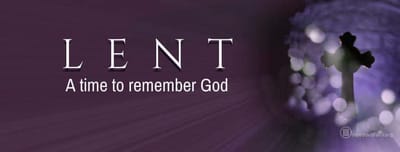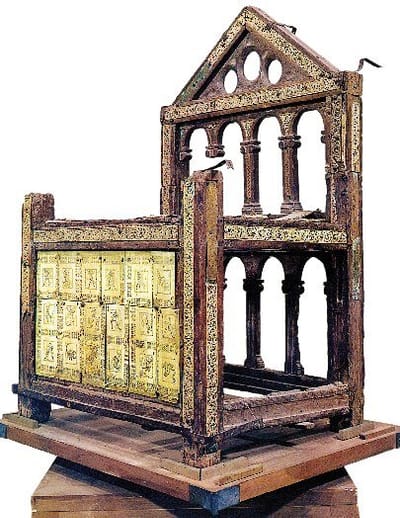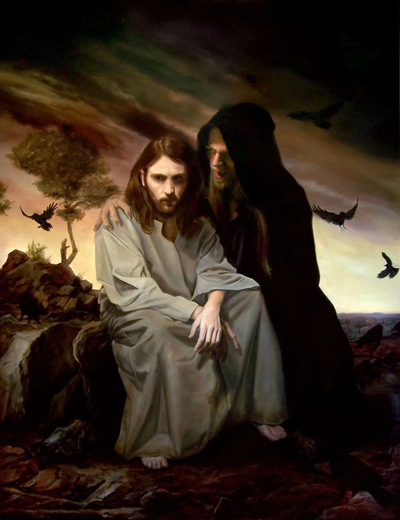About Today



Sunday 22 February 2026
1st Sunday of Lent
Christ the Lord was tempted and suffered for us. Come, let us adore him.
Or: O that today you would listen to his voice: harden not your hearts.
Year: A(II). Psalm week: 1. Liturgical Colour: Violet.
In other years: St Peter's Chair
This feast has been celebrated in Rome since at least the fourth century. It signifies the unity of the Church founded upon the Apostles.
Jesus fasts for forty days and is tempted
Gospel: Matthew 4:1-11
At that time: Jesus was led up by the Spirit into the wilderness to be tempted by the devil. And after fasting forty days and forty nights, he was hungry.
And the tempter came and said to him, ‘If you are the Son of God, command these stones to become loaves of bread.’ But he answered, ‘It is written, “Man shall not live by bread alone, but by every word that comes from the mouth of God.” ’
Then the devil took him to the holy city and set him on the pinnacle of the Temple and said to him, ‘If you are the Son of God, throw yourself down, for it is written, “He will command his angels concerning you”, and “On their hands they will bear you up, lest you strike your foot against a stone.” ’ Jesus said to him, ‘Again it is written, “You shall not put the Lord your God to the test.” ’
Again, the devil took him to a very high mountain and showed him all the kingdoms of the world and their glory. And he said to him, ‘All these I will give you, if you will fall down and worship me.’ Then Jesus said to him, ‘Be gone, Satan! For it is written, “You shall worship the Lord your God and him only shall you serve.” ’ Then the devil left him, and behold, angels came and were ministering to him.
Reflection on the painting
Last Wednesday we began our seven-week Lenten pilgrimage, a time that leads us toward the joy of Easter morning. Today’s Gospel reminds us that even Jesus himself faced temptation. The scene unfolds immediately after his baptism, when the heavenly voice declared him the beloved Son in whom the Father delights. It is precisely this identity that is tested in the wilderness, as each temptation begins with the challenge, “If you are the Son of God…” He is urged to turn stones into bread: to rely on himself rather than trust in the Father’s care. Yet throughout his ministry he will multiply bread only for the hunger of others, never for his own comfort. He is then invited by the devil to throw himself from the Temple to force God’s protection, but he refuses to manipulate his Father’s love, already secure in the knowledge that he is held by God. Finally, he is offered power and glory as a shortcut to success, yet he chooses instead the path of the Kingdom, a way marked by obedience, humility, and trust. At every step, Jesus answers temptation not with spectacle or force, but by grounding himself in the Word of God.
What makes this Gospel so powerful is that the testing of Jesus does not end in the desert. The same temptations return throughout his ministry and even at the hour of his death. Peter urges him to avoid the suffering of the cross; in Gethsemane he wrestles with the weight of what lies ahead; and from the cross itself voices mock him to save himself and come down. Yet each time he remains faithful to the Father who loves him. The struggle between trust and self-reliance, between obedience and the lure of power, runs like a thread through his entire life. And perhaps that is why this passage speaks so directly to us: the Christian journey is not about avoiding temptation, but about learning just as Jesus did, to rely always on God.
Our painting from 2011 is by contemporary American painter Eric Armusik, known for large-scale figurative works that draw deeply from classical artists such a Caravaggio and Gentileschi. In our canvas Armusik presents the desert encounter not simply as a narrative moment but as an intense psychological struggle. Christ sits calm and resolute at the centre. He is surrounded by the very scary, shadowy figure of the devil, who falsely puts his arm around Jesus. Ominous black birds fly in the background, further enhancing the sense of evil and danger. The devil and black birds suggest the seductive and disorienting nature of temptation. Rather than portraying temptation as spectacle, Armusik invites us into a quiet interior moment of reflection... a reminder that the real battleground is not what necessarily what surrounds us, but the human heart, where trust in God must be chosen again and again.
The Temptations of Christ,
Painting by Eric Armusik,
Painted in 2011,
Oil on canvas
© Eric Armusik, all rights reserved
1st Sunday of Lent
Christ the Lord was tempted and suffered for us. Come, let us adore him.
Or: O that today you would listen to his voice: harden not your hearts.
Year: A(II). Psalm week: 1. Liturgical Colour: Violet.
In other years: St Peter's Chair
This feast has been celebrated in Rome since at least the fourth century. It signifies the unity of the Church founded upon the Apostles.
Jesus fasts for forty days and is tempted
Gospel: Matthew 4:1-11
At that time: Jesus was led up by the Spirit into the wilderness to be tempted by the devil. And after fasting forty days and forty nights, he was hungry.
And the tempter came and said to him, ‘If you are the Son of God, command these stones to become loaves of bread.’ But he answered, ‘It is written, “Man shall not live by bread alone, but by every word that comes from the mouth of God.” ’
Then the devil took him to the holy city and set him on the pinnacle of the Temple and said to him, ‘If you are the Son of God, throw yourself down, for it is written, “He will command his angels concerning you”, and “On their hands they will bear you up, lest you strike your foot against a stone.” ’ Jesus said to him, ‘Again it is written, “You shall not put the Lord your God to the test.” ’
Again, the devil took him to a very high mountain and showed him all the kingdoms of the world and their glory. And he said to him, ‘All these I will give you, if you will fall down and worship me.’ Then Jesus said to him, ‘Be gone, Satan! For it is written, “You shall worship the Lord your God and him only shall you serve.” ’ Then the devil left him, and behold, angels came and were ministering to him.
Reflection on the painting
Last Wednesday we began our seven-week Lenten pilgrimage, a time that leads us toward the joy of Easter morning. Today’s Gospel reminds us that even Jesus himself faced temptation. The scene unfolds immediately after his baptism, when the heavenly voice declared him the beloved Son in whom the Father delights. It is precisely this identity that is tested in the wilderness, as each temptation begins with the challenge, “If you are the Son of God…” He is urged to turn stones into bread: to rely on himself rather than trust in the Father’s care. Yet throughout his ministry he will multiply bread only for the hunger of others, never for his own comfort. He is then invited by the devil to throw himself from the Temple to force God’s protection, but he refuses to manipulate his Father’s love, already secure in the knowledge that he is held by God. Finally, he is offered power and glory as a shortcut to success, yet he chooses instead the path of the Kingdom, a way marked by obedience, humility, and trust. At every step, Jesus answers temptation not with spectacle or force, but by grounding himself in the Word of God.
What makes this Gospel so powerful is that the testing of Jesus does not end in the desert. The same temptations return throughout his ministry and even at the hour of his death. Peter urges him to avoid the suffering of the cross; in Gethsemane he wrestles with the weight of what lies ahead; and from the cross itself voices mock him to save himself and come down. Yet each time he remains faithful to the Father who loves him. The struggle between trust and self-reliance, between obedience and the lure of power, runs like a thread through his entire life. And perhaps that is why this passage speaks so directly to us: the Christian journey is not about avoiding temptation, but about learning just as Jesus did, to rely always on God.
Our painting from 2011 is by contemporary American painter Eric Armusik, known for large-scale figurative works that draw deeply from classical artists such a Caravaggio and Gentileschi. In our canvas Armusik presents the desert encounter not simply as a narrative moment but as an intense psychological struggle. Christ sits calm and resolute at the centre. He is surrounded by the very scary, shadowy figure of the devil, who falsely puts his arm around Jesus. Ominous black birds fly in the background, further enhancing the sense of evil and danger. The devil and black birds suggest the seductive and disorienting nature of temptation. Rather than portraying temptation as spectacle, Armusik invites us into a quiet interior moment of reflection... a reminder that the real battleground is not what necessarily what surrounds us, but the human heart, where trust in God must be chosen again and again.
The Temptations of Christ,
Painting by Eric Armusik,
Painted in 2011,
Oil on canvas
© Eric Armusik, all rights reserved